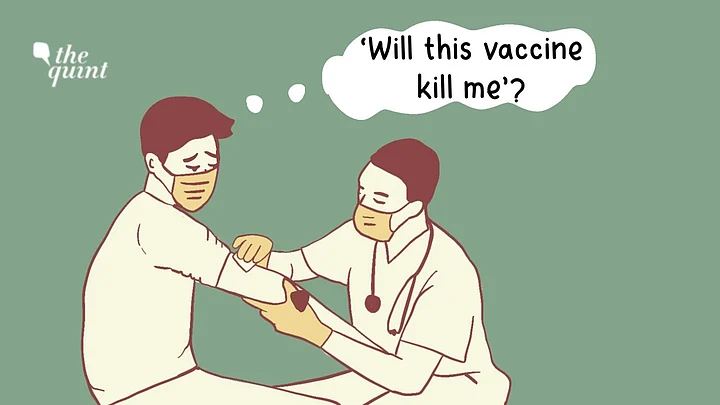On 16 January 2021, India had officially flagged off one of the world’s largest COVID‑19 vaccination campaigns to vaccinate its 1.38 billion population. As on 16 November 2021, while the active cases count for COVID-19 stood at 1,30,793 cases, India had administered just over 112 crore doses and counting.
Even as India crossed one billion COVID-19 vaccine doses, only 54.6 percent of India’s eligible adult population had taken at least one dose and close to 26 percent had completed both doses.
As more and more vaccines get approved and deployed, the focus seemingly shifts from addressing the gaps that had to be overcome to ensure equitable distribution of COVID-19 vaccines globally to enabling acceptance of the vaccines across countries and demographic segments.
Vaccine hesitancy or reluctance was significantly overlooked with the implicit expectation that people will accept the vaccine as mere availability would increase.
However, vaccine hesitancy exists, is real, and is widespread across regions; and vaccination teams have been grappling with the task of increasing coverage even after several reminders and awareness programmes. Vaccine hesitancy is a complex phenomenon, and the degree and extent of the hesitancy varies across time, place, context, and vaccines.
Hesitancy is also known to stem from lack of health awareness, from contexts of marginalisation and social exclusion, having had prior negative experiences at health services, being exposed to misinformation about vaccines, or a lack of faith in authorities and institutions in the very first place.
Overcoming Vaccine Hesitancy
Vaccine hesitancy in India is hence a complex, multifactorial, and historical challenge. India will have to focus on initiatives to address and build trust and take steps to overcome vaccine hesitancy. It is also of value to remind people of the benefits of vaccination through multiple media including phone messages, broadcast media, letters, phone calls to the community, etc.
Incentivising people who accept vaccination such that it encourages vaccination and improves compliance has also been effective. Incentives can range from simply providing vaccine related-leaflets to diet counselling to a complementary health check to name a few. People who lose their day’s earnings by visiting the vaccination centre could be compensated. This can go a long way in motivating daily wage workers and others who cannot afford to miss their daily wage for their vaccine appointment.
Involving Healthcare Workers
Involving physicians and healthcare professionals into the campaigns can provide huge dividends. Physicians and health professional continue to be the most trusted source of credible health information and more so for patients in rural communities. Unfortunately, the nature of lockdowns and safety protocols limited and restricted access to physicians and robbed the opportunity to discuss, engage, and convince communities. The possibility of providing telephonic consultation for local communities to talk to with public health and medical teams can prove to be a boon to patients who wish to understand the need for vaccination and get their concerns discussed. This could even work well among urban societies and condominiums.
Vaccination rates can also be significantly influenced by the quality of healthcare encounters and behaviour of health personnel. Community healthcare teams can better equip themselves to advocate for vaccination and maximise efforts to reduce patient apprehension.
Institution of home visits by healthcare teams and point‑of‑care reminders at public facilities can help instil vaccine benefits and improve acceptance.
Improving Communication and Engagement
To improve vaccine confidence and uptake, training healthcare professionals to communicate effectively and address hesitancy is crucial. Healthcare professionals are often confronted with vaccine hesitancy and having to manage difficult conversations, appease anxieties and respond to concerns. Training on community engagement must enable them to listen empathetically, convince and persuade, be open to questions and criticism and help instil positive behaviours. Communication strategies should be developed such that workers engage and help allay concerns, understand narratives, engage hesitant groups, and work together with key gatekeepers to the communities to enable trust.
Messages in the local language utilising local contexts should communicate facts while being relevant, engaging, and reflective of the benefits of vaccination. Health authorities should be enabled to quickly understand concerns, listen to people and their stories of hesitancy and allay the fears before hesitancy becomes deep-rooted.
Since vaccine hesitancy is multi-layered, no single approach can help overcome it in isolation. Interventions that involve multi-pronged strategies and those that focus on persuasion and dialogue-based approaches tend to perform better, are cost-effective and sustainable over more expensive social media or mass media campaigns. There is hence a need for health authorities to actively engage with the community, counsel and allay their concerns and help dispel rumours with robust evidence at their disposal.
(Allen P Ugargol & Arnab Mukherji are Faculty at Centre for Public Policy, IIM Bangalore & Members, Health Policy Group, IIM Bangalore. This is an opinion piece and the views expressed above are the author’s own. The Quint neither endorses nor is responsible for them.)
